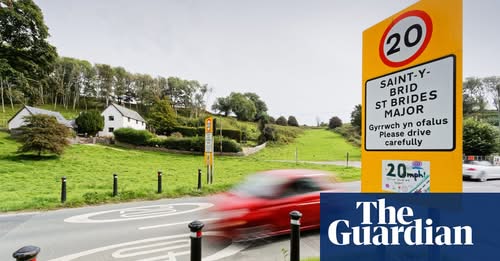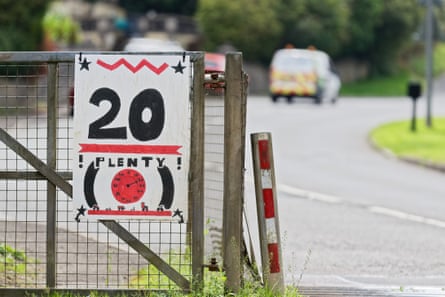A Social Media Post From A Welsh Labour Councillor
The text below appeared in a social media post in March 2025 from a Welsh Labour Councillor who attended a seminar run by ’20s Plenty’.
As already noted, 20’s Planty is a globalist organisation which is massively invested in ensuring that the blanket 20mph speed limit regime remains in place in Wales irrespective of what the majority of people of Wales might want!!
For us, the following reads as if it was a script written by ’20’s Plenty’ themselves for propaganda purposes, to be shared by useful people like this Councillor on social media, rather than something he had written himself. The full text of what he posted is as follows:
“I attended a very constructive seminar together with councillors from all political parties from all over Wales on the Positive Impacts on Road Safety due to the 20mph speed limit.
Speakers shared the latest data and actual facts on the speed reduction implementation.
Phil Jones from PJA Ltd shared compelling data showing a 28% reduction in casualties on 20/30mph roads since the implementation of the 20mph limit. This equates to 678 fewer injuries, including 10 fewer deaths and demonstrates the clear benefits of lower speed limits in areas where people and traffic mix.
Rod King MBE explained that a few councils are increasing the speed limit on a small number of roads (less than 1% overall) to 30mph. He highlighted the legal risks to Local Councils of increasing speed limits were casualties to occur in future on those roads.
Increasing Adoption Across the UK:
While much of the focus has been on Wales, Richard Owen from Agilysis highlighted that England and Scotland are also adopting 20mph zones at an increasing pace. This growing trend supports the idea that 20mph is becoming a more common, and accepted, speed limit across the UK, particularly in urban areas.
Financial Benefits for Drivers:
Rob Clarke from esure insurance explained how lower speeds lead to reduced collision risks, translating into lower insurance premiums for drivers. This financial benefit – estimated by esure to be currently £45 per driver per year – is a strong incentive for the wider public to embrace 20mph limits.
Enforcement and Public Support:
The session covered key concerns such as enforcement, compliance, and public acceptance. We discussed how evidence from Wales shows that even with limited enforcement, public acceptance of the 20mph limit is steadily increasing. The data supports the fact that lower speed limits are not only safer but also easier to implement than initially thought.
Looking Ahead:
The positive results in Wales are paving the way for further expansion across the UK. As more local authorities adopt 20mph zones, we are seeing a cultural shift towards safer, more human-friendly streets. This move aligns with the growing consensus that the right speed limit where people and traffic mix is 20mph.
The growing body of evidence strongly supports the idea that 20mph limits are an effective, cost-efficient, and necessary step towards safer communities. As more data emerges, it’s becoming clearer that 20mph zones not only reduce casualties but also foster better, healthier environments for everyone. We’re excited to continue this important conversation.
The positive feedback from councillors of all parties was encouraging and the benefits to their own communities in all areas of Wales were good to hear first hand.”
There are a number of issues arising from the above script which are worthy of challenge as the 2026 Senedd Election Campaign gets underway.
More Early Electioneering Perhaps?
The following article by Guardian correspondent Peter Walker appeared in the newspaper on 22nd March 2025.
Following not long after the propaganda piece (above) it was clearly designed to silence the various protest groups opposed to the 20mph regime that have sprung up across Wales since the Welsh Labour party rejected the petiton of nearly half a million people :
Wales’s 20mph speed limit has cut road deaths. Why is there still even a debate?
Research suggests the scheme may be more popular than thought, with consultations dominated by a loud minority

Even with the caveats about limited data and untangling causation and correlation, the statistics are striking: the first year of a scheme in Wales where the speed limit on urban roads was lowered to 20mph resulted in about 100 fewer people killed or seriously injured.
Introduced in September 2023 as a major road safety project of the Labour-run Welsh government, it made 20mph the default limit for any built-up area, defined as roads where lamp-posts were no more than about 180 metres apart. This took in about a third of all roads, with the Conservative opposition saying the definition was far too broad.
At the time, other controversies were raging over roads policies, including low-traffic neighbourhoods and the expansion of London’s ultra-low emission zone – a culture war embraced by some Tory politicians.
Countering this, increasingly, is hard evidence. While Welsh government statisticians warn that at least three years’ data will be needed for a meaningful conclusion, the road casualty figures – showing an estimated 10 fewer deaths and a nearly one-third drop in overall casualties – follow research from insurers indicating that 20mph zones appear to be bringing down the number of claims.
Peter Fox, who covers transport issues for the Conservatives in the Senedd Cymru, insists his worries about 20mph zones are not about the general idea, just how it was implemented, with the lower limit taken as the standard for built-up streets.
“None of us are against 20mph around schools, busy residential areas, or anywhere where there’s quite a lot of pedestrian footfall,” he said. “But we didn’t need to change the default position.”
Lee Waters, who was transport minister in the Labour-run Welsh government when the policy was introduced, has called it “the most successful road safety intervention in modern times”. But even he concedes that with retrospect it could have been done differently.
“You have to apply the sniff test,” he said. “If someone is being asked to drive at 20mph and it doesn’t make sense as to why, you have a problem. There wasn’t sufficient capacity or willingness locally to use the flexibility within the guidance, to apply it on a place-specific basis.”

Experts say consultations on 20mph zones tend to be dominated by dissent, with supporters silent as they assume they are in the minority. Photograph: Dimitris Legakis/Athena Pictures
This was subsequently addressed in Welsh government guidance to councils to help them identify areas where 20mph schemes were inappropriate and the speed limit widely flouted. Officials say this assessment process is coming to an end, and changes have been made.
Now 20mph zones are being proposed and implemented beyond Wales, and not just from Labour politicians. Cornwall council, in south-west England, which is run by the Conservatives, began a programme of reducing speed limits to 20mph in urban areas in 2022, and it is still being expanded.
Connor Donnithorne, the councillor who leads on transport matters in Cornwall, said their policy had been different to Wales, including a more targeted approach and a focus on encouraging people to reduce their speed using signs rather than enforcing it with cameras.
“The idea is to do all this in a pragmatic way,” he said. “The issue is that if you force people to go 20mph on a road where it doesn’t make sense, it’s very difficult to change driver behaviour and patterns. That’s why we’ve worked very hard with the highways team to make sure that it is done in the right places, because that brings the community along with us.”
For all the progress, a key question remains: as more and more evidence arrives, why is all this still even a debate? As Waters puts it: “There is still this idea that 70 or so road deaths a year in Wales is acceptable. But we would never accept 70 deaths a year on the ferry to Ireland, or on buses.”1
Some argue that it is because of what is called motornormativity, an idea devised by Ian Walker, a professor of environmental psychology at Swansea University. This sets out that car ownership and use is so ubiquitous that people are all too often unable to think beyond it.
One result, he argues, is that people implicitly accept deaths and injuries on the roads as this is seen as essentially random, and so in a curious way almost fair, when in fact the odds are notably worse for pedestrians and cyclists.
“This isn’t generally done in bad faith,” Walker said. “It’s just a very car-centric mindset of thinking the risk is distributed equally, when for some it’s much higher and systemic.”
Another aspect of Walker’s research has an even more pertinent lesson for politicians: policies such as 20mph zones are often more popular than people think.
A study he led, based in the UK, US and the Netherlands, found that two-thirds of people believed they personally supported non-car travel more than the public at large. This is an example of a social-psychological phenomenon called pluralistic ignorance, where people automatically assume the consensus must differ from their own views.
In this case, it seemingly happens “because people rarely see changes to the car-first status quo being seriously discussed or supported, let alone implemented”, Walker argues. As such, he says, consultations on 20mph zones tend to be dominated by dissent, with supporters silent as they assume they are in the minority.
There is, perhaps, a lesson here for politicians, although not an easy one: sometimes it can be best to ignore the noisiest voices, and take the evidence-based course.
Only Time Will Tell
In voting for Brexit, the Welsh people essentially gave their Government a madate to take back control of their country from the globalists, but this hasn’t happened under Labour Party, far from it in fact.
In the light of arguments now presented both for and against the blanket 20mph speed limits in Wales, it will be very interesting to see how the political parties now formulate the election campaign manifestos on this polarising issue, recognising that this is essentially a fight between the little people and the globalists.

Welsh voters simply want more freedom and less government. Meanwhile the authoritarian Labour Party continues to crush their spirit by perpetutuating the ‘speed kills’ myth in order to further globalist agendas whlist detracting attention away from thair fundamental road safety reponsibilities as embodied in our Five Reforms.
- If Mr Waters reads this and is truly concerned, let him produce his analysis of how these 70 annual deaths occur and tell us what, specifically, has been learned and acted upon by his Government to help prevent future tragedies instead of gaslighting all drivers. ↩︎